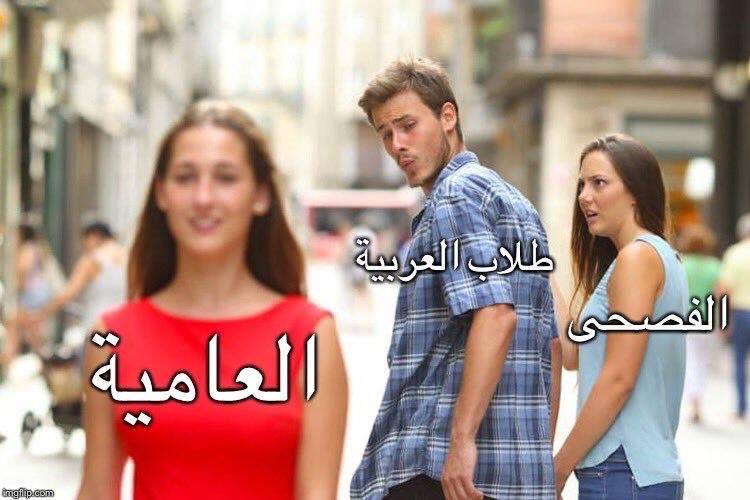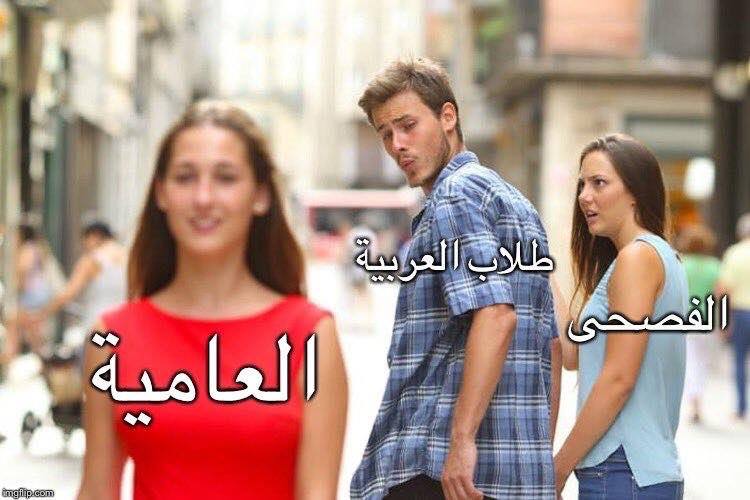
Meme found here
The meme above seems to be making the rounds for everything these days, and the image above popped up in my Facebook feed the other day. I smiled, because it my experience it captures a common conundrum in Arabic teaching—we usually focus on Modern Standard Arabic, MSA, الفصحى in the classroom, much to the dismay of many Arabic students, especially those who go abroad. In my own research on Arabic study abroad students, many of them complain about the “uselessness” of fus7a, and support studying Arabic dialects prior to study abroad, so they don’t lose time learning 3ammiyya (although my research also shows they pick up major dialect features quite quickly, sometimes within a few weeks of going abroad). Students and teachers that oppose dialect teaching typically point to the regional variations in dialects, and that students travel to different locations and teachers in the same program may be familiar with varying regional dialects. In this perspective, MSA is seen as being a “neutral” variety because it is used across geographical regions (although research also shows that there is geographical variation in MSA, and speakers of different regional varieties do not necessarily switch into MSA to speak to each other). Thus, whether to teach dialects or not is a seemingly never-ending debate with strong feelings (and not much research) on both sides.
However, the reason this image captured my attention is that it points to some things I think are often overlooked in this debate, namely ideology and emotion and how these intersect. I wrote before about how the language classroom tends to ignore the social to focus on academic or transactional language, and I think this is actually at the heart of the فصحى\عامية debate in Arabic language teaching. In this image “طلاب العربية” clearly wants a relationship with “العامية” much to the dismay of ““الفصحى”. Similarly, although we tend to argue that طلاب العربية need to learn العامية to engage in basic everyday transactions during study abroad, the real reason I think they care so much is that العامية is (usually) the language of establishing relationships, and this much more important to many study abroad students than using Arabic in academic contexts. So while they may not be after the type of romantic relationship pictured in this image (although research on study abroad does note that this is an important, though overlooked, component of study abroad), they almost certainly desire relationships with Arabic speakers, and it is clear to them from the beginning of their experience that 3ammiyya is the language of these social relationships*. Thus, the ability to access social relationships is at the heart of Arabic students’ desire to learn 3ammiyya, much more than the ability to order food or take a taxi or do any other basic service encounter that could probably be done with gestures and/or English. In this way, not teaching 3ammiyya can be interpreted as preventing students from accessing these social relationships. Although I don’t think this is ever the intention of those who promote only teaching MSA, I think it is the source of the emotionally-laden frustration students express in response to this policy.
The next reason this meme is particularly compelling is the look of disappointment on الفصحى’s face. Language ideology usually comes up in the 3ammiyya/fus7a debate in terms of fus7a being perceived as the “correct” version of Arabic. However, I think the ideological issue is actually less about what is the “correct” version for non-Arab learners to learn, and more about how those who grow up speaking Arabic (especially in an Arabic school system) perceive the relationship between 3ammiyya and fus7a. While the word “Arabic” could conceivably include both MSA and dialects, اللغة العربية tends to only refer to الفصحى. I have met countless Arabs who tell me (in Arabic) how bad their Arabic is and how they failed all their Arabic classes—they mean fus7a, without even considering what they are doing as speaking اللغة العربية. In contrast, those who speak fus7a well are understandably proud of the years of effort they have put into developing their abilities, and want to convey this knowledge to Arabic learners . . . who promptly ignore it to go after 3ammiyya for social relationships! So here, there is also an underlying emotional response, as students (again unintentionally) devalue the knowledge speakers of fus7a have worked so hard to become experts in.
This tendency to focus on academic and transactional language, and ignore the social and emotional is of course not limited to Arabic, it just happens to map well onto the ideology of Arabic diglossia and be the case I am most familiar with. Yet what would happen if we recognized the value we should place on social language and emotions in academic language learning settings?
*Yes, there are people who form social relationships in الفصحى. However, in my experience people who do this also remark upon it, as in “my friend and I always speak فصحى together” or “I like hanging out with study abroad students because I can speak فصحى”.

Leave a Reply